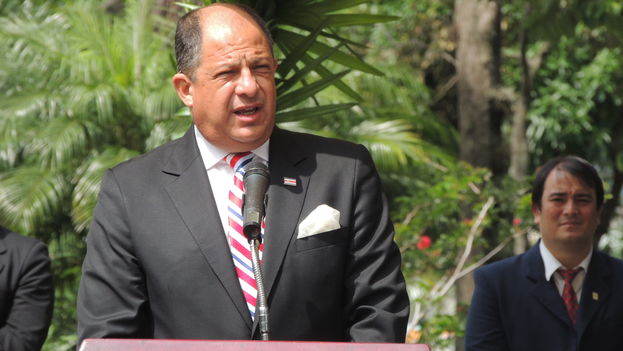
![]() EFE (published in 14ymedio), San Jose, Costa Rica, 26 November 2015 — The president Luis Guillermo Solis of Costa Rica, on Wednesday, guaranteed the thousands of Cuban migrants who have been stranded in his country since 14 November that his government will make every effort to help them reach the United States, their final destination. “We will do whatever is necessary for you people to get to your destination and while you are here to live with dignity,” said the president at a press conference in San Jose.
EFE (published in 14ymedio), San Jose, Costa Rica, 26 November 2015 — The president Luis Guillermo Solis of Costa Rica, on Wednesday, guaranteed the thousands of Cuban migrants who have been stranded in his country since 14 November that his government will make every effort to help them reach the United States, their final destination. “We will do whatever is necessary for you people to get to your destination and while you are here to live with dignity,” said the president at a press conference in San Jose.
Solis said that, following Nicaragua’s opposition to allowing the islanders to pass through that country, Costa Rica is making bilateral contacts with other countries involved in the migratory path of these people, to find a solution.
The solution is to “establish routes that allow them to continue their journey. The conditions, time and number are details that we are refining, but in this situation it is clear that we will not have the cooperation of Nicaragua and therefore we must take other measures under consideration.”
President Solis said that Costa Rica will not abandon the Cuban immigrants, but warned that their trip to the United States will be a process that will take time.
“In Costa Rica we will facilitate their travel and this entails a great effort not only to conclude the final negotiations with each country, many of whom will announce measures in the coming days, but also to guarantee, as long as they are in our territory, that they are living in adequate conditions,” he said.
Solis’s involvement in the case of Cuban migrants even led to an exchange views with the Cuban singer Silvio Rodriguez through the artist’s blog. The Costa Rican president left a comment on a post in which the singer demanded solutions for the migrants and criticized Solis for advocating a humanitarian corridor to the United States only for the Cubans and not for other Latin American, knowing that “there is a special law that favors the arrival of our people with dry feet.”
Solis Rodriguez said that it is most urgent is to find solutions for those at the border who are not at fault. The president also added that Nicaragua and Costa Rica would be wrong to “insinuate the situation of the migrants into geopolitics.”
Costa Rican Minister of Communications Mauricio Herrera Ulloa also responded to the musician, saying that his government’s request is “more than politics, it is humanitarian.”
The troubadour thanked the minister for his comments and acknowledged having written his post without all the information and out of concern for his compatriots. But then, Rodriguez added: “In addition to the best intentions of the Government in which you are a minister, there is constant propaganda against my country.”
Meeting in El Salvador on Tuesday, the foreign ministers of the countries of Central America, the Dominican Republic, Cuba, Mexico, Ecuador and Colombia sought a solution to the current crisis and also a long-term solution to Cuban emigration.
However, Nicaragua was adamant in not allowing the entry of Cubans to its territory, and accused Costa Rica of causing a humanitarian crisis by “ignoring the responsibility of the United States in the issue of illegal migration” and demanded that the immigrants be withdrawn from the border area.
As of 14 November, Costa Rica has granted temporary transit visas to 3,600 Cubans who arrived at its border with Panama, and has set up 12 shelters to provide humanitarian aid in communities near the border with Nicaragua.
President Solis also said that resolving the crisis will require “slowing down” the flow of Cubans into Costa Rica from Panama.
On Tuesday the Costa Rican Foreign Minister Manuel Gonzalez accused Nicaragua of being “intransigent” and acting in “bad faith” in this matter and said the region intends to find a solution.
The immigrants left Cuba legally by air and flew to Ecuador, which does not require them to have a visa, and from there they traveled “irregularly” through Colombia and Panama to Costa Rica.
The Costa Rican government has attributed this migratory wave to the dismantling of a human trafficking network and the rumor on the island that the United States is going to repeal its immigration laws that favor Cubans.
